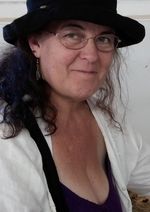Mrs. Mike and Growing Up

People accumulate things. In many families, those things become the inheritance that is passed on. A grandmother's ring, a favorite table, a set of silverware or china are the heirlooms bequeathed with love and pride from one generation to another. Belongings of the ancestors are precious to the descendants. In some cases, even if the family line dies out, the property goes into museums, because it represents the life and times of people of a former age.
In my case, when my parents died I wasn't settled, I didn't have anywhere to put their belongings, I didn't have a household. My relatives were scattered, my siblings far away. So the things that represented my parents' lives were disseminated at yard sales. Aside from a couple of pieces of jewelry, a pocketknife and some photographs, I don't have anything that belonged to my parents. It's all gone. All the things that they touched and used in their lives were either destroyed or are being used by other people who never knew them.
When I was in my twenties the lifestyle I chose was foreign and strange to my parents. I didn't really comprehend then that one day I would understand them and that they would understand me too. I don't think I'm the only person who has experienced this. I was raised Catholic and when I turned 20 I volunteered to do missionary work for another church. The result was a profound gulf of loneliness on both sides. There arose within me a two pronged focus to develop a relationship with God and do His will as best I knew how, and to still be my parents' daughter and to fulfill their hopes and expectations at the same time.
A long time ago I read the book, "Mrs. Mike" by Benedict and Nancy Freedman. It's the story of a 16 year old girl from Boston, Katherine Mary, in the year 1910. She goes to Edmonton, Alberta, Canada, to live with an uncle, where her mother believes her chronic health problems will improve.
After a short time living with her uncle, she meets and marries a big, handsome Canadian mountie named Mike Flannigan. They dogsled 700 hundred miles north into the wilderness and settle there for four years. She lives an eternity in those four years, witnessing things that most ordinary people never face in a lifetime.
She sees little cemeteries full of people who died in epidemics, she bears her babies with the help of a midwife. Faced with a forest fire, she stands in a river up to her neck all day, choking on ash and smoke, huddled together with wild animals and Indians and white settlers, all waiting for the fire to burn out. Her friend, Sarah, the midwife, has a son who inadvertently steps in a bear trap one day while hunting. They can't get the trap off, and Sarah has to saw her son's leg off, while he lies on the kitchen table screaming.
More traumatic things happen to her. Katherine Mary decides she can't go on anymore and travels home to Boston to see her family. She secretly doesn't know if she will return to her husband, because the calamities they lived through put such a strain on their marriage.
She stays in Boston for a couple of months and when she gets there she's surprised to find out that she has in a way, outgrown her family. She can't relate with their petty fears and prejudices, and the things that occupy their thoughts and their time. She realizes that her home is with Mike, out in the wild, living on the edge, taking care of the Indians and settlers in their territory. She loves her family, but she has grown beyond their scope. When she realizes that she can't stay in her childhood home any more, she goes back to Mike.
Looking back on all of the collected data of my life, I think that even though the roads diverged, I ironically have fulfilled the hopes and dreams that my parents wished for me -- a committed marriage with beautiful children and a life focused on specific values. I only wish they were here to share it.
A lot of people have had a similar experience. We're born and we grow up and we search for things that may not be apparently there in our immediate enclave. Sometimes we upset those whom we love during the searching process. And yet like Dorothy from the Wizard of Oz, we end up in our own little bed at the end of our travels.
I believe the unuttered prayer of most people is that eventually all the tears will be wiped away and humanity will resonate in a common, loving empathy. That's the outcome I'm betting everything on.
Kim lives in Maine, which is lovely, and where she continues her enthusiastic relationship with Art, Music, Nature, Books, Animals, Humor and Trees.


